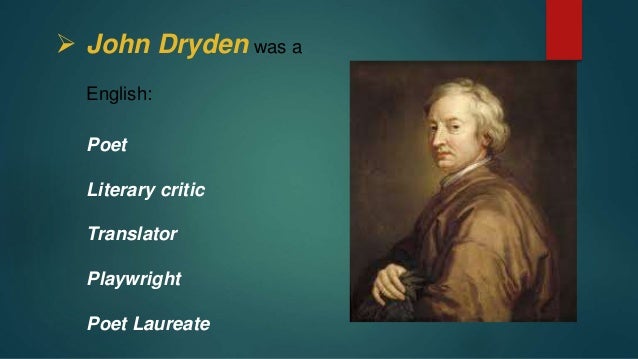Dryden is distinguished as not only an excellent poet,
dramatist and author in his own right, but also as somebody whose great
intellect and sound powers of argument enabled him to write excellent criticism
of literature. Dryden had extensively studied the classical works coming from
Ancient Greece and Rome, the English Renaissance and also works of contemporary
France. He did this in order to understand how literature worked and to identify
key ingredients upon which it beneath.
Dryden was both a writer and a critic and he had rather
a dogmatic bent. Most of his critical interpretations are found in the prefaces
to his own works. In Dryden we find an interest in the general issues of criticism
rather than in a close reading of particular texts. We call Dryden a
neoclassical critic, just as Boileau. Dryden puts emphasis on the neoclassical
rules. His best-known critical work, An Essay on Dramatic Poesy, partly
reflects this tension in Dryden's commitments. Its dialogue form has often been
criticized as inconclusive, but actually, as in most dialogues, there is a
spokesman weightier than the others. Dryden carried out his critical thoughts
effectively, stating his own ideas but leaving some room for difference of
opinion. Neander's overall statement on the literary standards is that, the
norms can be added to make the work ideal, but the norms will not improve a
work which does not contain some degree of perfection. And as Dryden believes,
we may find writers like Shakespeare who did not follow the rules but are
nevertheless obviously superior to any "regular" writer. Shakespeare
disconcerts Dryden; he recognises his superiority but within himself he would
feel closer affiliations with Ben Jonson. In Dryden, then, we find a
"liberal" neo-classicist, although he is most coherent (a trait of
classicism) when he is dealing with that which can be understood and reduced to
rule.
John Dryden wrote “An Essay of Dramatic Posey” in 1668.
Original title of this book is “Of Dramatic Posey, an Essay”. In his book, we
can see both of his nature as a poet and as a playwright. He write this essay
as a dramatic dialogue with the four character representing four critical
position. In this book he discusses five issues.
1.
Ancient
vs English Drama
2.
Utilities
3.
French vs
English Dramas
4.
Separation
of tragedy & comedy vs tragicomedy
5.
Appropriateness
of rhymes in Drama
This book he favours
the modern English Plays but does not diverge the ancients. He said that French
plays have only one plot without sub-plot. He also favors English Drama and has
some critical things to say of French Drama:
“Those beauties of
French poesy are such as will raise perfection higher where it is but are not
sufficient to give it or where it is not; they are indeed the beauties of
statue, but not of a man.”
He was a critic of
contemporary reality. His critical observation of contemporary reality is
reflected in “Mackfleknoe” (1682). Thoughts of literary criticism on ancient,
modern and English literature especially on drama are presented in dialogue
from in “An Essay Of Dramatic Poesy.”

0 Comments